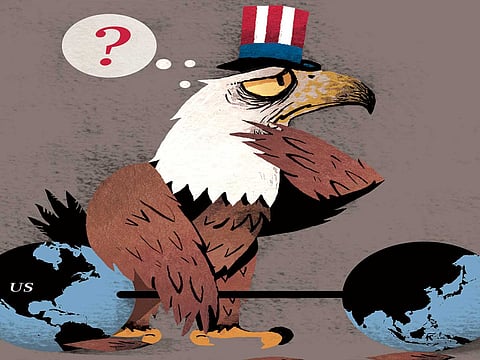Is the US really all that weak?
Whatever Trump and Cruz may say, the tools with which America might do more are already there for the taking

The tendency is especially marked among the Republicans. Viewed from abroad the United States often looks like a hulking, and occasionally uncertain, superpower: a country whose military might is awe-inspiring, despite its own uncertainties over when and how that power should be used. Listen to American politicians talk, however, and a very different picture emerges.
“We’re not a rich country. We were a rich country, and with a very strong military and tremendous capability in so many ways. We’re not anymore. We have a military that’s severely depleted,” Donald Trump told the New York Times last week during a wide-ranging interview focused on foreign policy.
When the conversation turned to Saudi Arabia he said: “We lose, everywhere. We lose monetarily, everywhere.” Trump’s answers tended to ramble, but a consistent thread ran through them: America is weak and poor and getting poorer because it is being fleeced by its so-called allies. Even if defending those allies is in America’s political and strategic interest (a highly debatable idea, in Trump’s view) that is a luxury a broke country simply can’t afford.
As in many things Trump’s main rival, Texas Senator Ted Cruz, is less bombastic but not far removed in policy terms.
“In order to restore America’s safety and security we must rebuild our military,” Cruz’s website states. “If you think defending the country is expensive, try not defending it. We must rebuild our military in a way that will secure our children without bankrupting them.”
Both men are eager to project American power into the Middle East. Trump has called for seizing the oil fields controlled by Daesh. Cruz wants to carpet bomb the group. Both are fuzzy regarding whether these policies might eventually require tens of thousands of ground troops to back them up (fuzzy because such policies definitely would require ground troops, but suggesting another invasion in the Middle East is a political non-starter in the US).
Yet all this raises an obvious question: if America has the ability to overwhelm Daesh while also honouring its myriad other military obligations, how is the US also a frail, pathetic power — one who China and other countries push around “at will” because, as Trump told the New York Times, “they have no respect for our president, and they have no respect for our country”?
If you were wondering how all of this compares to the Democrats, Vermont Senator Bernie Sanders is open to increasing defence spending but only if doing so does not require cutting social programmes (which, in the real world, it might). His website makes the standard nods to a “strong defence”, but leaves the distinct impression that he is in no hurry to get the US into any new military ventures. This is hardly surprising since Sanders’ early and loud opposition to the 2003 invasion of Iraq is one of his main selling points vis-a-vis Hillary Clinton.
Fantasy world
Clinton is harder to parse, which is, perhaps, surprising in one who has been on the national stage for nearly a quarter of a century. Her campaign website offers the standard political boilerplate about ensuring that America “maintains the best-trained, best-equipped and strongest military the world has ever known”. The key word there is “maintains”. It is an acknowledgement that it is only in a fantasy world that America is a dangerously weak power.
For most of her time as secretary of state, Clinton was regarded as one of the Obama administration’s more hawkish figures — advocating greater involvement in Syria in private and pounding the table at a Friends of Syria Group meeting in 2012 in frustration at the world’s inaction as the country slipped into civil war.
Reasonable people can differ about whether (and, if so, how) the US ought to get more deeply involved in Syria but it is a lot harder to make a case that Washington lacks the ability to do so. To quote an oft-cited statistic, the American defence budget is roughly equal to that of the next nine countries combined — including the other four permanent members of the United Nations Security Council. Whatever Trump and Cruz may say, the tools with which America might do more are already there for the taking.
The question voters are likely to face this autumn is whether chest-thumping rhetoric — Trump’s oft-repeated assertion that “We never win anymore” — is enough to justify more money and a lot more adventurism on the world stage.
Is demonstrating toughness a core value of American foreign policy? If the answer is ‘yes’, and voters confirm that in November, and then prepare for a rocky four years of interventionism.
I



